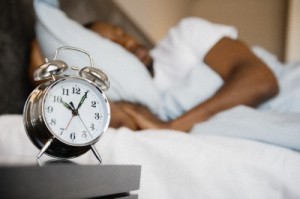(ThyBlackMan.com) Lately, I’ve encountered numerous requests form people asking for “something to help me sleep”. This made me take a closer look, and I realized how many of us are not getting enough sleep.
If you regularly get less sleep than your brain requires, then you are, by definition, sleep deprived.
Scientists have yet to determine exactly why people sleep. However, they do know that humans must sleep and, in fact, people can survive longer without food than without sleep.
Every creature needs to rest. Giraffes, little babies, elephants, dogs, cats, kids, grandparents, moms, dads, and lions in the jungle – they all sleep! Just like eating, sleep is necessary for survival.
Sleep gives your body a rest and allows it to prepare for the next day. It’s like giving your body a mini-vacation. Sleep also gives your brain a chance to sort things out. Scientists aren’t exactly sure what kinds of organizing your brain does while you sleep, but they think that sleep may be the time  when the brain sorts and stores information, replaces chemicals, and solves problems.
when the brain sorts and stores information, replaces chemicals, and solves problems.
The amount of sleep a person needs depends a lot on his or her age. Babies sleep a lot – about 14 to 15 hours a day! But many older people only need about 7 or 8 hours of sleep each night. Most kids between the ages of 5 and 12 years old are somewhere in between, needing 10 to 11 hours of sleep. Some kids might need more and some need less. It depends on the kid.
Skipping one night’s sleep makes a person cranky and clumsy. After missing two nights of sleep, a person will have problems thinking and doing things; his or her brain and body can’t do their normal tasks nearly as well. After five nights without sleep, a person will hallucinate (this means seeing things that aren’t actually there). Eventually, it becomes impossible for the brain to give its directions to the rest of the body without sleep – the brain needs to spend time in bed and catch its ZZZs!
We still don’t fully understand the importance of sleep. What we do know is that sleep is a building, process. And we think it restores the body’s energy supplies that have been depleted through the day’s activities. Sleep is also the time when the body does most of its repair work; muscle tissue is rebuilt and restored. We know, for example, that growth hormone is secreted during sleep. This hormone is important for growth in children, but is also important throughout adulthood in rebuilding tissues.
Think of the body as a car. No car can keep going and going and going without a tune-up or oil change. If it’s not tuned, the car may keep running, but not as smoothly as it did when it was maintained properly. You can think of sleep as your body’s daily tune-up.
Human beings can function without a full tune-up, but they will be in a state of sleep deprivation and won’t be able to work or to think as well as they do when they are fully rested. It’s like an engine that gets only four out of eight spark plugs replaced and then runs sluggishly.
Sleep is also a time for restoring mental energy. We spend all day thinking and creating, and that uses up our energy stores.
Scientists have proposed the following theories on why humans require sleep:
• Sleep may be a way of recharging the brain. The brain has a chance to shut down and repair neurons and to exercise important connections of neurons that might otherwise deteriorate due to lack of activity.
• Sleep gives the brain an opportunity to reorganize data to help find a solution to problem, process newly learned information and organize and archive memories.
• Sleep lowers a person’s metabolic rate and energy consumption.
• The cardiovascular system also gets a break during sleep. Researchers have found that people with normal or high blood pressure experience a 20 to 30% reduction in blood pressure and 10 to 20% reduction in heart rate.
• During sleep, the body has a chance to replace chemicals and repair muscles, other tissues and aging or dead cells.
• In children and young adults, growth hormones are released during deep sleep.
• When a person falls asleep and wakes up is largely determined by his or her circadian rhythm, a day-night cycle of about 24 hours. Circadian rhythms greatly influence the timing, amount and quality of sleep.
Oh yeah, and don’t think that just because you’re a “tea-toddler”, you’re safe behind the wheel of a car. In fact, you can be more dangerous than a drunk driver. Lack of sleep or sleep deprivation can cause similar effects to those of alcohol. These include symptoms such as blurred vision, poor balance and decreased concentration. Thousands of accidents occur each year from lack of sleep – costing millions of pounds and loss life. The main dangers are when driving or operating potentially hazardous machinery.
Just recently, two commercial pilots were suspended for falling asleep at the cockpit and missing their landing! Can you imagine how many lives could have been lost? The dangers of lack of sleep are very real. One pilot later confirmed that he suffered from sleep apnea – a sleep disorder causing the sufferer to wake frequently without breath.
Without proper sleep we can’t operate at optimum level; we feel sluggish, tired, irritable and drowsy. But there are other more serious problems that lack of sleep can cause. Long-term sleeplessness increases the risk of psychological disorders and disease and potentially life threatening conditions. These include obesity, heart disease, cardiovascular disease, depression, diabetes, psychosis and hypertension.
To begin a new path towards healthier sleep and a healthier lifestyle, begin by assessing your own individual needs and habits. See how you respond to different amounts of sleep. Pay careful attention to your mood, energy and health after a poor night’s sleep versus a good one. Ask yourself, “How often do I get a good night’s sleep?” If the answer is “not often”, then you may need to consider changing your sleep habits or consulting a physician or sleep specialist.
Most importantly, make sleep a priority. You must schedule sleep like any other daily activity, so put it on your “to-do list” and cross it off every night. But don’t make it the thing you do only after everything else is done – stop doing other things so you get the sleep you need.
Remember, I’m not a doctor. I just sound like one.
Take good care of yourself and live the best life possible.
This column is not intended to replace the medical advice or treatment from a qualified health professional.
Written By Glenn Ellis
Official website; http://www.GlennEllis.com

















Leave a Reply